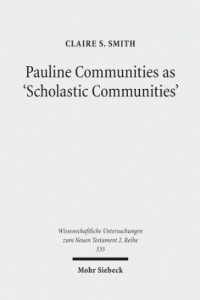Learning and church structures: a stimulating book by Claire S. Smith
This book addresses a really important topic, the ‘learning’ nature of the Pauline communities (especially in Corinth, Ephesus and Crete)—although the title is technical rather than inviting—and it’s stimulated me to write about a particular point arising from it. In general, I’ve enjoyed reading Claire Smith’s book and a full review (I wrote almost 2500 words) will appear on the excellent Review of Biblical Literature in due course (I’ll post here when the time comes). The particular point that I want to note here is an implication of her work for church life, in the ancient world and today.
Dr Claire Smith is contributing to debate arising from the fine work of Prof. Edwin Judge, a pioneer of social-scientific study of the NT. Judge proposed that the earliest Christian communities would not be immediately recognised as ‘religious’ by their contemporaries, because they did not practise many of the expected ‘religious’ activities, notably offering sacrifice. Rather, Judge suggested, they would be recognised as being ‘scholastic’, but which he means communities where teaching and learning are a major focus. Smith seeks to develop and undergird Judge’s argument by studying the use of 55 Greek words which concern teaching and learning, focused on 1 Corinthians and the Pastoral Epistles.
The key point I want to highlight here is the implications for the nature of church life. Smith draws out some implications for thinking about Christian education ‘which may also inform and critique modern church practice’ (392). Here is the key bit:
...the wide range of activities and participants in the education activities has implications for contemporary models of ministry or church. Teaching activities in this study were not confined to public or formal or verbal instruction, or matters of belief only, or practised only by recognised teachers or leaders…it is very clear that relationships were an essential part in the educational environment of the community. Existing relationships provided the content and/or context for didactic activities like remembering, correction, and imitation, and addressers were to invest themselves in persuading addressees, and have a person interest in their successful learning and progress. Relationships placed constraints on who might participate in teaching, and when, and how. The correspondence between an addresser’s conduct and message further demonstrated the essential and pivotal role of relationships in the educational process. This relational emphasis has significant implications for discussions about ‘learning communities’ generally, and for contemporary Christian practice, particularly with the advent of on-line media. (392-93)
This is fascinating, for it implies that all that students tell me about the importance of the quality of their relationships with their teachers or (for research students) supervisors is echoing this Pauline emphasis. It also rather implies that building bigger and bigger churches (numerically) is not necessarily the best way to ensure growth if it is done at the cost of relationships through which truth can be seen as well as heard.
The study itself is not a light read—555 pages plus almost 100 pages of tables in appendices—but it’s saying some very important things about the nature of Christian learning and growth. Thanks to Dr Smith for her labours in producing this!
Full publication details:
Claire S. Smith, Pauline Communities as ‘Scholastic Communities’: A Study of the Vocabulary of ‘Teaching’ in 1 Corinthians, 1 and 2 Timothy and Titus, WUNT II/335, Tübingen: Mohr Siebeck, 2012. €94.00. ISBN 9783161519635
GoogleBooks has much of it available here.



Reading the title, I expected to disagree with the message because it appeared to be implying that the teaching was more divorced from daily or ordinary life. Contrarily the quoted abstract, or nub of the message, seems to be pointing to a lesson which needs to be re-learnt (again) by the church. So much of the gospel is caught rather than taught? but no it’s not either/or it’s both/and and the 2 need to back each other up or the disciple won’t “get it”. (I’m not ‘Rev-ed’ up or working in academia but my business is Christian education.)